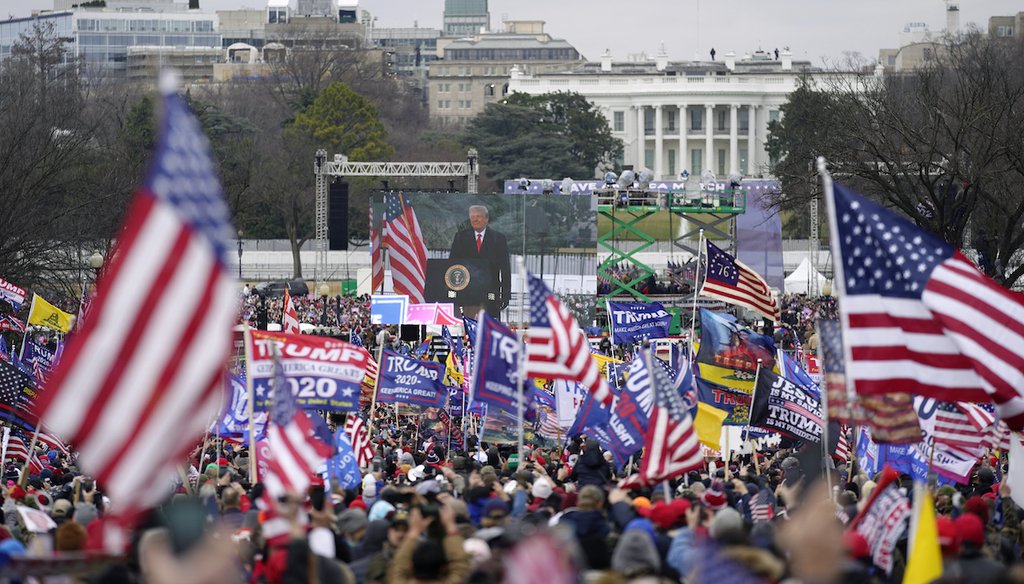Stand up for the facts!
Our only agenda is to publish the truth so you can be an informed participant in democracy.
We need your help.
I would like to contribute

Thousands of people gathered at a rally near the White House Jan. 6, 2021, to show their support for President Donald Trump and his baseless claims of election fraud. (AP)
If Your Time is short
-
U.S. Attorney General Merrick Garland said in early 2021 that he would use a bottom-up approach to investigate wrongdoing related to the Jan. 6, 2021, attack on the U.S. Capitol.
-
The Justice Department focused initially on individual rioters, then on militia groups.
-
In November 2022, Garland named Jack Smith as special counsel to lead two investigations: Trump’s post-presidency handling of classified documents and his attempts to overturn the 2020 election.
Former President Donald Trump and his fiercest critics agree on this: It took a long time to bring charges against Trump related to his efforts to hold onto the presidency after the 2020 election.
Democrats who felt the charges were long overdue questioned why a congressional committee investigating the Jan. 6, 2021, U.S. Capitol attack moved faster than the Justice Department. Trump, who seeks the 2024 Republican Party presidential nomination, saw suspicion in the indictment’s timing.
Prosecutors now must contend with scheduling hearings, and possibly a trial, during an election year.
"Why didn’t they bring this ridiculous case 2.5 years ago?" Trump said on his social media platform Truth Social Aug. 1, the day he was indicted. "They wanted it right in the middle of my campaign, that’s why!"
We’ve seen no evidence to support Trump’s allegation that Special Counsel Jack Smith is intentionally timing the charges to hamper Trump’s campaign. PolitiFact found reporting that said there were some disagreements in the Justice Department on how to approach this case. Still, complex federal cases routinely take years to investigate before they reach the indictment stage.
A Justice Department spokesperson declined to comment for this article.
The Justice Department went after rioters first
During Garland’s 2021 confirmation hearing, lawmakers asked whether he would investigate ringleaders who were absent during the Capitol attack. Garland said he would use a bottom-up strategy.
"We begin with the people on the ground and we work our way up to those who were involved and further involved," Garland said. "We will pursue these leads wherever they take us."
The people on the ground were the rioters; so far more than 1,000 people have been charged. Many of those cases were straightforward and included photographic or video evidence of violence and vandalism. Then, prosecutors filed larger conspiracy cases against members of militia groups such as the Oath Keepers and the Proud Boys.
By spring 2022, prosecutors had also issued subpoenas to people involved in planning and organizing Trump’s "Save America" rally, which happened on the Ellipse near the White House before rioters entered the Capitol.
The types of crimes Trump was ultimately charged with were related to conspiracies to submit fake electors slates and persuade other elected and appointed officials to overturn the election. Smith did not charge Trump with seditious conspiracy, a charge that was used against leaders of the on-the-ground riots.
'A wariness about appearing partisan'
An investigation by The Washington Post, based on anonymous interviews, said that it took prosecutors and FBI agents more than a year to launch a formal investigation of Trump’s role in the Jan. 6 attack. An earlier plan to directly investigate Trump associates was quashed by Justice Department officials, and prosecutors initially focused on the rioters — not Trump, The Washington Post reported in June.
"A wariness about appearing partisan, institutional caution, and clashes over how much evidence was sufficient to investigate the actions of Trump and those around him all contributed to the slow pace," the investigation said.
J.P. Cooney, chief of the U.S. Attorney’s Office’s public corruption division, proposed investigative steps in February 2021 that were rejected by the FBI and senior Justice Department officials, The Washington Post found. Cooney later joined Smith’s team.
The Washington Post reported that in April 2022, FBI director Christopher Wray authorized opening a criminal investigation into the plot by Trump and his allies to replace legitimate Biden electors with slates of pro-Trump fake electors. The fake electors in December 2020 submitted certificates to the federal government stating that Trump won in battleground states that he actually lost.
Also slowing the investigation’s pace was that the Senate didn’t confirm Matthew Graves, President Joe Biden’s nominee to be U.S. attorney in Washington, D.C., until October 2021. Matthew G. Olsen, Biden’s nominee for assistant attorney general for national security, was also confirmed that month.
Jan. 6 committee moved faster than Justice Department
The Jan. 6 House select committee, which held hearings in summer 2022, proceeded more quickly than the Justice Department. It issued its final report in December 2022.
But the Justice Department operates by different rules and norms than congressional committees do. Lawmakers held public hearings and went on national TV to discuss their probe. Federal prosecutors typically are mum about details of their investigative process.
Garland told reporters in July 2022 that a "central tenet of the way in which the Justice Department investigates, a central tenet to the rule of law, is that we do not do our investigations in public. This is the most wide-ranging investigation and the most important investigation that the Justice Department has ever entered into. … We have to get this right."
The Justice Department’s approach to the case may have also been influenced by the historic nature of bringing an indictment against a former president who could be president again.
"He knows that this is the most consequential investigation that the DOJ (Justice Department) has ever undertaken — and certainly in its breadth, it is the biggest ever," Jamie Gorelick, a former federal prosecutor who knows Garland, told Ankush Khardori, an attorney and former federal prosecutor who wrote about Garland for Politico.
In November 2022, Garland named Smith special counsel to lead two investigations related to Trump: his post-presidency handling of classified documents and interference in the 2020 election. Garland at the time said he was appointing a special prosecutor because of Trump’s announcement that month that he was running for president and Biden’s expected reelection campaign.
Trump was indicted in the documents case about six months after Smith’s appointment, and in the 2020 election case within eight months of his appointment.
In September 2022, before Smith was appointed, The New York Times reported that the Justice Department issued about 40 subpoenas to Trump advisers seeking information about the fake electors plan and seized phones of two of his aides. The grand jury heard testimony from dozens of witnesses including campaign aides, fake electors and former Vice President Mike Pence.
It took time to interview high-level figures from Trump’s orbit, said Bradley Moss, Washington, D.C., attorney who specializes in national security matters.
"No reasonable prosecutor would bring this case unless and until they were confident they had an extensive and comprehensive factual record," Moss said, "and that included not only interviewing a myriad of Trump’s inner circle but also overcoming legal obstacles to allow them to interview people like Mike Pence and Trump’s lawyers."
Past federal cases took two or more years
Other high-profile Justice Department investigations have taken at least two years to reach an indictment.
Former Sen. John Edwards, D-N.C. — the 2004 vice presidential nominee — was indicted in 2011, for allegedly participating in a scheme to violate federal campaign finance laws. The grand jury indictment came more than two years into the investigation. Eventually, a jury found him not guilty on one count related to accepting illegal contributions and deadlocked on five other charges, resulting in a mistrial.
Sen. Bob Menendez, D-N.J., was indicted in April 2015 for an alleged bribery scheme; rumors of an investigation circulated as early as January 2013. An 11-week trial in 2017 ended in a hung jury.
The Justice Department also investigated former representative Chaka Fattah, D-Pa., for at least two years before reaching an indictment. The Philadelphia Inquirer reported that in March 2013, the IRS and FBI officially launched an investigation into Fattah’s finances, particularly on an illegal loan worth $1 million that he received during his failed 2007 mayoral run. Fattah and four associates were indicted July 29, 2015.
RELATED: Who is Jack Smith, special counsel for Trump classified documents, 2020 election indictments?
RELATED: Read indictment of Donald Trump in the special counsel’s 2020 election, Jan. 6 investigation
Our Sources
New York Times, Sharp Contrasts With Other Jan. 6 Inquiries Increase Pressure on Garland, July 25, 2022
CNN, Garland’s first year leading Justice Department clouded by questions of investigating Trump, March 6, 2022
Merrick Garland Testifies At Attorney General Confirmation Hearing | NBC News, Feb. 22, 2021
CNN, 6 takeaways from Merrick Garland’s confirmation hearing, Feb. 22, 2021
NBC News, Merrick Garland calls Justice Department’s Jan. 6 probe the ‘most wide-ranging investigation in its history’, July 26, 2022
The Washington Post, Grand jury investigating Sen. Robert Menendez (D-N.J.), people familiar with probe say, March 14, 2023
Associated Press, Federal officials scrutinize land deal involving Arizona lawmaker, Oct. 25, 2006, accessed via Nexis
Politico, The Merrick Garland You Don’t Know, Jan. 15, 2023
Politico, A Former Mueller Prosecutor Takes Merrick Garland to Task
New York Times, Merrick Garland Should Investigate Trump’s 2020 Election Schemes as a ‘Hub and Spoke’ Conspiracy, July 11, 2022
The Washington Post, FBI resisted opening probe into Trump’s role in Jan. 6 for more than a year, June 20, 2023
The National Enquirer, Feds eye John Edwards probe, March 31, 2009
Justice Department, Former Senator and Presidential Candidate John Edwards Charged for Alleged Role in Scheme to Violate Federal Campaign Finance Laws, June 3, 2011
Associated Press, John Edwards faces federal investigation, May 4, 2009, accessed via Nexis
CNN, Trial bookmarks John Edwards’ fall from grace, June 1, 2012
The New York Times, Federal Agents Raid Offices of Donor Linked to Senator Menendez, Jan. 30, 2013
Justice Department, Senator Robert Menendez and Salomon Melgen Indicted for Conspiracy, Bribery and Honest Services Fraud, April 1, 2015
NorthJersey.com, Dr. Salomon Melgen, who stood trial with Sen. Bob Menendez, gets clemency from Trump, Jan. 20, 2021
Justice Department, Congressman Chaka Fattah and Associates Charged with Participating in Racketeering Conspiracy, July 29, 2015
Politico, Longtime congressman Fattah indicted, July 29, 2015
The Philadelphia Inquirer, A timeline of events in the Fattah case, July 29, 2015
ABC News, DOJ expands Jan. 6 probe to include planning of 'Save America' rally, March 31, 2022
Email interview with Joan Meyer, former prosecutor and partner at the law firm Thompson Hine LLP, Aug. 2, 2023
Email interview with Bradley Moss, Washington, D.C., attorney who specializes in national security matters, Aug. 2, 2023






































